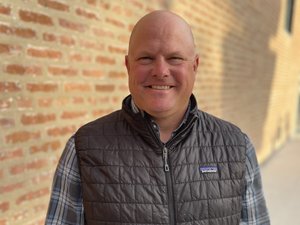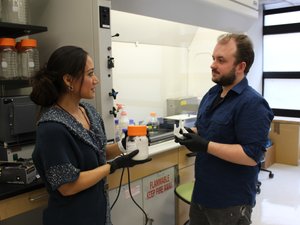
For most of his life, Lukas Garza has suffered with postural orthostatic tachycardia syndrome (POTS).
The condition, which is a form of orthostatic intolerance, affects circulation and causes its victims to experience lightheadedness, fainting and a rapid increase in heartbeat when they stand up. Usually, the only way symptoms are relieved is by sitting or lying back down.
POTS, which began showing symptoms in Garza when he was in high school, limits patients' mobility and can eventually make them extremely weak. At his weakest, Garza says he was only 113 pounds and could barely get out of bed.
Garza said his doctors couldn’t do much for him because research on the disease is still fairly limited. But after reading online that a vegan diet might help his symptoms, he switched immediately and saw his health improve gradually.
He then had enough energy to follow a specific exercise regimen for POTS patients. But to maintain proper energy levels, he needed protein-packed foods and supplements, which is what led to him creating his own coffee brand.
“I really couldn’t find a single product that met all of my criteria,” he said.
Powerhouse Coffee, which Garza launched last year, is a plant-based and high-protein coffee that’s also organic, vegan, gluten-free and non-GMO. The coffee’s protein is sourced from quinoa and peas, Garza said. The coffee is freeze-dried and packaged into individual stick packs that can be mixed with water, milk or any milk alternative consumers wish to use.
The coffee also comes in flavors, such as Columbian chocolate, creamy French vanilla and cinnamon hazelnut.
“Why not take something people already love and make it better?” Garza said. “I love coffee. I need protein. Why not protein coffee?”
Garza said he is still solidifying the formula and working with food scientists to extend the product’s shelf life. But he plans to begin selling Powerhouse online in August. It’s currently only available for pre-order on the startup’s website. A pack of 14 retails for $49.99.
Eventually, Garza wants to sell Powerhouse in local and national grocery chains. To help propel the startup to commercialization, Garza has been receiving support and mentoring from Future Founders’ 2019 residency cohort, an accelerator program for entrepreneurs ages 18 to 30. The program began in January and runs through August, Garza said.
“The whole Future Founders community has been really encouraging,” he said. “They really provide the resources and the connections to build confidence in you as a founder.”
Powerhouse Coffee isn’t alone in the protein coffee market. Bulletproof Coffee, based in Seattle, makes a product that combines coffee, oil and butter. Plus, several companies now sell protein-packed coffee creamers that could compete with Powerhouse’s all-in-one product.
Chicago-based Unicreamer, which is making a high-protein and vegan coffee cream powder, launched last year. And Vital Proteins, also based in Chicago, has become increasingly popular, and can be found in Whole Foods and other retailers. The company sells several collagen supplements, including coffee creamers.








